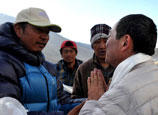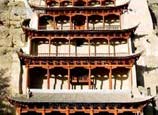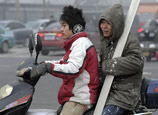
5. Many people outside China follow with great interest domestic and foreign policies of the new government in China. They want to know whether China will seek hegemony when it grows stronger, and some are concerned whether China can sustain growth. How would you address these two concerns?
Li: In my view, such concerns are uncalled for.
As an old saying in China goes, "To raise a family, one needs to know the price of rice and firewood." As the premier of a big country with 1.3 billion people, what I have to face every day are the "seven daily necessities of a family", namely firewood, rice, cooking oil, salt, soy sauce, vinegar and tea. In other words, I need to address issues that affect people's lives. The Chinese people want better education, more stable jobs, greater social security, improved housing conditions and richer cultural life. To manage well these seemingly "simple" things is not easy. China remains a developing country. To achieve modernization is an arduous task for us. The pursuit of peaceful development is not just a foreign policy goal; it is also determined by China's reality. China will not seek hegemony even when it grows stronger. Having had a full share of sufferings in modern history, we Chinese believe that you should not do unto others what you do not want them to do unto you.
In the era of globalization, interdependence is the basic feature defining state-to-state relations. The law of the jungle is not the way to govern human society; only mutually beneficial cooperation will make the world a better place. I want to stress that to pursue peaceful development is the unshakable resolve of the Chinese government. Likewise, to uphold China's sovereignty and territorial integrity is also the unshakable resolve of the Chinese government. These two principles go hand in hand and conform to norms for maintaining regional stability and international peace and order.
Disagreement and frictions among countries are unavoidable. What is important is how you deal with them. One could either take an intransigent approach to these issues and hype them or properly handle them through consultation based on mutual respect. This is a yardstick to test whether a country is broad-minded. It is only in recent years that the Chinese have started to lead a good life. We cherish such good times, and want to embrace the world with a more open mind. And we hope that others will look at China with the same open mind. As a major developing country, China will work with other countries to uphold peace and prosperity in the 21st century.
China still faces a grave and complex external environment in pursuing development. The global economic recovery remains weak, protectionism resurfaces from time to time, and the monetary policy of quantitative easing as pursued by some countries may cause negative impacts. We are proactively coping with these issues and stepping up cooperation with other countries. We have confidence in China's economic development because a solid foundation has been built in the past 30-plus years of reform and opening-up and there is huge potential for further development. China will continue the policy of reform and opening-up and maintain sustained growth by pursuing industrialization, IT application, urbanization and agricultural modernization. This will create more opportunities for the global economy.

















 10 million-yuan bra shines in Shengyang, North China
10 million-yuan bra shines in Shengyang, North China


![]()
